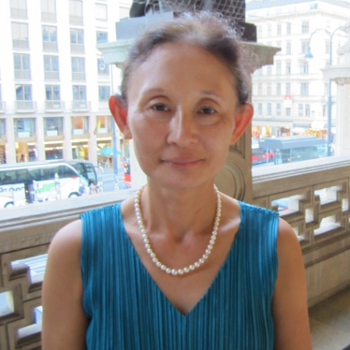“Prince Orlofsky’s New Year’s Ball 12-31-99” said the writing on a vintage postcard on a black curtain in front of The Met's stage. So we were all invited to a ball at the turn of the century Vienna as imagined by producer Jeremy Sams, who also wrote the English lyrics for a new production of Die Fledermaus at the Met in 2013, brought back this season, conducted by James Levine.
The year 1899 was some 25 years from the operetta’s première in Vienna in 1874, and during the quarter century the glittering and carefree world of rich aristocrats and budding bourgeoisie depicted in the work was increasingly under threat by a variety of political and economic forces that were to plunge Europe and the rest of the world into a century of conflict. There was no hint of the ominous changes to come in the production here. The focus was on the Vienna Secession, a movement that began in 1897 and embodied turn-of-the-century Vienna. The living room of Rosalinde and Gabriel von Eisenstein in Act I was awash in red curtains and velvet furniture, and two paintings attributable to Gustaf Klimt adorned the walls. In the Act II ballroom scene, the gold-leafed dome of the secession building served as a huge overhead piece housing a chandelier. The gilded gates of Act II were carried over to the jail in Act III and used to separate the warden’s office from jail cells.
The much-criticized lengthy dialogue, especially in Frosch's scene, were trimmed in the revival, and the overall performance was tightly organized and well paced. While there were slight glitches in the pit-stage co-ordination, noticeable in the ballroom scene with the chorus, they were minor and it was an appropriately frothy but enjoyable first night, filled with familiar melodies and waltzes. Levine conducted the overture with a fine emphasis on the overall texture of the orchestration. He began slowly, with attention to lithe and transparent melodies, and gradually built the volume and tempo to the finish.
The cast included two singers from the première, Susanna Phillips as Rosalinde and Paulo Szot as Dr Falke, a friend of von Eisenstein. Dr Falke’s light-hearted scheme to take revenge on his friend’s previous prank on him is the main plot. He invites von Eisenstein and his wife to the ball of a wealthy Russian prince; his invitations are also extended to Rosalinde’s maid Adele and to the prison warden Frank, who is to imprison von Eisenstein for several days. Slightly complicating the plot is the presence of Rosalinde’s former lover Alfred, and Adele’s sister Ida.
Susanna Phillips was in splendid voice, her plush soprano easily dominating the ensemble. Her high notes were warm yet thrilling, and she had a great sense for comic acting. The English tenor Toby Spence played von Eisenstein as an adorable, spoiled rich man, easily duped by his friend and his wife. His voice was at times slightly underpowered, but he was an effective member of the ensemble. Paulo Szot showed off his strong stage presence both vocally and dramatically. The Act I trio with Phillips, Spence and Szot was one of the musical highlights, as was the the famous “Watch Duet” in Act II.
The soprano Mireille Asselin performed the maid Adele, replacing Lucy Crowe, who was ill. Asselin brought her lovely lyrical voice to the role, supported by a strong technique. Her coloratura was smooth and effortless, and her high notes were especially memorable in her arias. Her voice is perhaps a bit small for The Met, but it was an impressive performance under the circumstances. Dimitri Pittas as Alfred was having a lot of fun playing a somewhat goofy former lover of Rosalinde, his tenor voice ringing out strongly.
The veteran Susan Graham sang and acted Prince Orlofsky with great humor and flair, wearing a silverly wig, fake mustache and a richly decorated tuxedo. Her voice was rich and glamorous, and her understated acting was quite effective. Alan Opie impressed as Frank with his deep voice and comic acting. Actor Christopher Fitzgerald was a hilarious Frosch, and he delivered his lines with aplomb but did not overstay his welcome on stage.
Johann Strauss II never pretended that he was any more than a great composer of light hearted waltzes and operettas to entertain the Viennese public, although some of his arias are quite challenging. The Met’s revival of his beloved Fledermaus was performed very much in this spirit, and is a perfect holiday entertainment to laugh and forget about the harsh world outside for a few hours.




